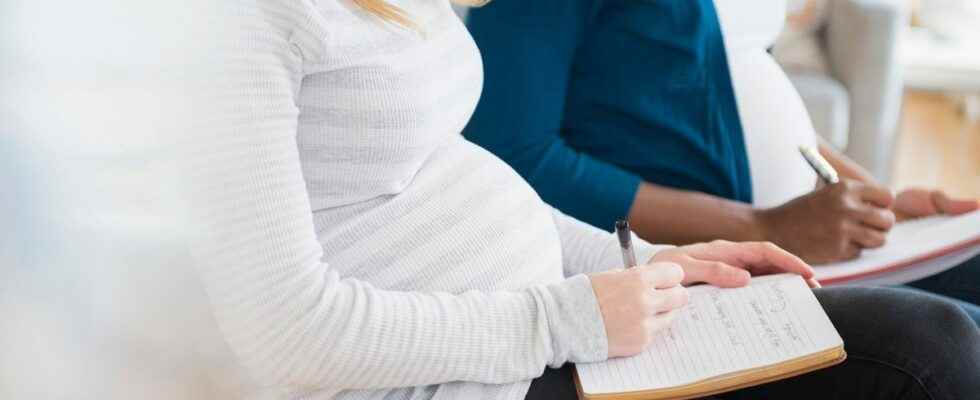Published on
Updated
Reading 4 mins.
in collaboration with
Géraldine Dahan Tarrassona (Midwife and editor-in-chief of the magazine “Parole de Sages-femmes”)
In Japan, an experiment carried out on future mothers seems to have borne fruit: a “course” to know what to expect when the baby arrives seems to limit the risks of postpartum depression. An idea to decline in France?
What if postpartum depression could be avoided by understanding a little better what to expect with a newborn, thanks to a course dedicated to this brand new parenting? In any case, this is the hypothesis tested in Japan, a country where the evolution of families towards more urban (and less family-friendly) areas has seen the rate of postpartum depression increase considerably.
A course to boost the confidence of new single mothers
“Mothers in urban Japan are at high risk for postpartum depression”, Yoko Shimpuku, a professor at Hiroshima University’s Graduate School of Biomedical and Health Sciences, said of the background to her study. “We found that a two-hour course, called Help, Understanding, Guidance (HUG) Your Baby, significantly reduced this risk and increased parent confidence.”
The HUG Your Baby program, used and evaluated here, was developed in 2013 by Jan Tedder, a family nurse practitioner and lactation consultant in the United States, to help parents understand their baby’s behavior. It is developed in many countries.
More than 220 women were recruited for the Japanese study, between February 2015 and February 2016, divided by schedule to avoid cross-contamination between the control and intervention groups. The control group received regular prenatal treatment and a pamphlet with additional information, while the intervention group participated in a two-hour course consisting of a HUG lecture on how to recognize and respond to the behavior of a baby – including sleep-wake cycles – and hands-on learning with a doll. The intervention group also received information about breastfeeding.
Participants then completed standardized scales on postnatal depression and parental confidence, and answered questions demonstrating knowledge of the baby’s behavior at one and three months postpartum.
Fewer depressions detected in mothers who took the training
Scores taken by participants in both groups at one month indicated they were at higher risk for postpartum depression than a national survey, but the intervention group had lower scores than the control group.
“The HUG Your Baby intervention can be said to have reduced maternal depression among high-risk mothers living in urban Japan” concluded Dr. Shimpuku. The intervention group also had more confidence at one month, which persisted at three months, at which time the control group caught up.
“This is particularly interesting”, according to Shimpuku, “since the intervention group had more “new” mothers, as pregnant women who already had children were less likely to have time to attend class”. For those responsible for the study, “the growing research base of this program suggests that it should be continued, expanded and studied more closely by other researchers to better understand and develop its potential for increasing positive parenting experiences, both in Japan and elsewhere in the world”.
NO to diets, YES to WW!
Should we decline this idea in France?
In France, pregnant women benefit from 7 preparation sessions for birth and parenthood, a prevention check-up and an early prenatal interview and, since last July, an early postnatal interview.
“Even if all women do not participate in all of what is offered, it can be noted that postpartum depression nevertheless affects 15 to 20% of women.”reveals Géraldine Dahan Tarrasona, midwife and member of our Doctissimo expert committee.
The 2021 National Perinatal Survey showed that 16.7% of mothers suffered from major symptoms of depression 2 months after childbirth, 15.5% had a difficult or very difficult experience and 11.7% a bad experienced or even very bad experience of childbirth.
Would a two-hour course, even a well-informed one, change the trend? The midwife expresses a doubt:
“Prenatal information is important but it is a vast cobblestone and it is therefore difficult to admit that two 2 hours are sufficient to act effectively against postpartum depression. The study cited was carried out on a hundred patients, the sample is small to be able to conclude.”
In addition, the study only targets a lack of confidence present in the future mother, but this is not the only cause of depression.
“To prevent postpartum depression, it is essential to be able to detect all forms of vulnerabilities of the future mother in the antenatal period in order to offer support that is as close as possible to her needs and to best accommodate the child to come. Indeed, vulnerabilities will represent risk factors for postpartum depression, which may also negatively influence mother-child interactions.
She ends with a message dedicated to pregnant women, as a benevolent reminder:
“We are still lucky enough to have birth and parenthood preparation courses reimbursed by health insurance and various interviews, so let’s take advantage of these moments to get informed, ask questions, prepare for childbirth. , such as parenthood. If there is a context that prevents you from flourishing during pregnancy, talk to a midwife, gynecologist, general practitioner, who will be able to direct you to a suitable professional (for example psychologist, assistant social…) to accompany you. And take time for yourself, above all”.
